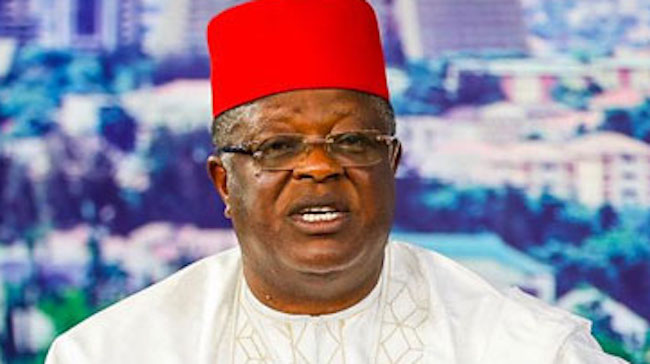By Mercy Aikoye
The Minister of Works, Dave Umahi, has expressed concerns that the N800 billion allocated to his ministry in the 2025 budget proposal is insufficient to address the country’s road infrastructure needs. Speaking during the 2025 budget defense session organized by the House Committee on Works, Umahi appealed to the committee to consider increasing the Ministry’s budgetary allocation for the 2025 fiscal year.
Umahi emphasized that the N800 billion allocation cannot adequately address the country’s road needs, highlighting the need for additional funding to complete ongoing projects and initiate new ones across the country. He noted that the scope of road projects the Ministry aims to undertake cannot be achieved with the current “meagre budget allocation.”
The Minister stressed that borrowing funds to address Nigeria’s infrastructure deficit is crucial for the nation’s progress. He explained that investing in infrastructure is key to emerging from recession, as it serves as a catalyst for economic activities. Umahi added that this investment will have a positive impact on various sectors, including food sellers, sand suppliers, gravel workers, and others.
Umahi’s appeal for increased funding comes amidst concerns over the state of Nigeria’s road infrastructure. Studies have shown that only 15% of the country’s roads are paved, with many rural areas lacking access to basic road infrastructure.¹ This inadequate infrastructure has significant implications for the country’s economic development and food security.
The Minister’s comments were echoed by the Chairman of the Committee, Akin Alabi, who promised to summon the Minister of Finance and the Head of the Budget Office to explain the rationale behind the ministry’s low budget allocation. This move suggests that the committee is taking Umahi’s concerns seriously and is willing to explore options for increasing funding.
Umahi’s emphasis on the need for adequate funding for road infrastructure is consistent with research highlighting the importance of investing in infrastructure to drive economic growth.² Nigeria’s infrastructure deficit is a significant challenge, and addressing it will require sustained investment and commitment from the government.
The Minister’s call for borrowing funds to address the infrastructure deficit is also supported by experts, who argue that investing in infrastructure can have long-term benefits for the economy.³ However, this approach must be carefully managed to avoid exacerbating the country’s debt burden.
In conclusion, Umahi’s appeal for increased funding for road infrastructure highlights the significant challenges facing Nigeria’s transportation sector. Addressing these challenges will require a sustained commitment to investing in infrastructure, and the government must carefully consider its options for funding these investments.



